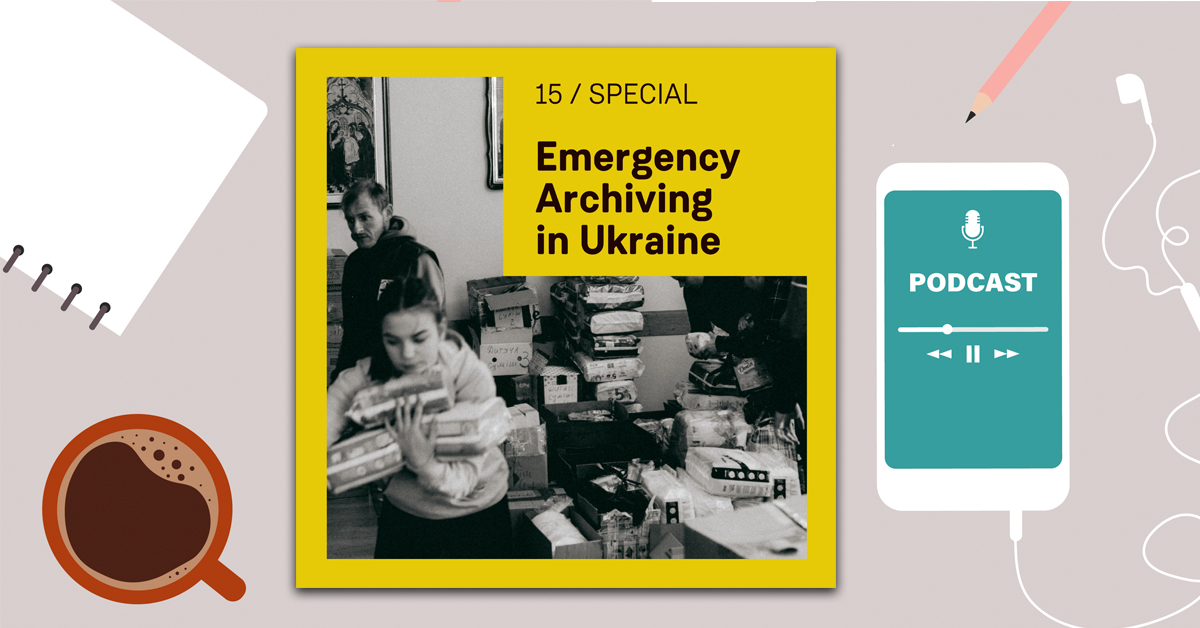Diese Podcast-Folge wurde auf Englisch produziert. Auf YouTube haben Sie die Möglichkeit, englische und deutsche Untertitel einzublenden.
Am 24. Februar marschierte Russland in die Ukraine ein. Der schreckliche Angriff veränderte schlagartig das Leben von Millionen von Menschen. Viele wurden durch den brutalen Krieg vertrieben, andere entschieden sich zu bleiben und humanitäre Hilfe zu leisten oder ihr Land zu verteidigen. Auch Kolleg*innen vom Center for Urban History in Lwiw entschieden sich, nicht fortzugehen und den Krieg zu dokumentieren. Eigentlich analysieren Historiker*innen die Vergangenheit, in der Ukraine bewahren sie nun die Gegenwart. In dieser Podcast-Episode sprechen Natalia Otrishchenko, Taras Nazaruk, and Oleksandr Makhanets über ihr Projekt »Testimonies from the War«, ihr Konzept des »Emergency Archiving» und darüber, wie sie neue Wege der Oral History und der Visual History erkunden.
Infolge der russischen Invasion müssen viele ukrainische Wissenschaftler*innen nicht nur um das Wohlergehen ihrer Angehörigen, sondern auch um das Schicksal ihrer jahrzehntelangen Arbeit bangen. Sie versuchen, das kulturelle Erbe, Archivdokumente und Forschungsdaten zu schützen. Im Center for Urban History hatten einige Historiker*innen und Soziolog*innen eine inspirierende Idee, wie sie darüber hinaus einen Beitrag leisten könnten: Sie starteten ein neues Projekt zur Dokumentation des Krieges und zur Sammlung von Daten über Massenvertreibungen, Widerstand und Freiwilligenarbeit. In dieser Podcast-Folge stellen sie ihr Projekt vor. Ukrainische Wissenschaftler*innen befragen Geflüchtete, andere sammeln und archivieren visuelle Zeugnisse auf. Sie führen Projekte mit Schüler*innen durch, um ihre Erfahrungen in Form von multimedialen Kriegstagebüchern zu reflektieren. Expert*innen für Digital History archivieren ausgewählte Kanäle der Social-Media-Plattform Telegram für zukünftige Forschungen. Auf der Grundlage dieser Daten wurde von Karyna Lazaruk ein erstes Forschungsposter über russische Kriegsnarrative und ihre gezielte Verbreitung über die sozialen Medien veröffentlicht.
Das ZZF kooperiert seit einigen Jahren mit Kolleg*innen Lwiw, insbesondere im Rahmen des internationalen Forschungsprojekts »Legacies of Communism«. Diese Folge ist ihrer Arbeit gewidmet. Natalia Otrishchenko ist zurzeit Non-Residential Fellow des ZZF.
ENGLISH:
On February 24, Russia invaded Ukraine. The horrible attack abruptly changed the lives of millions of people. Many were displaced by the brutal war. Others decided to stay and provide humanitarian aid or to defend their country. Colleagues from the Center for Urban History in Lviv also chose not to leave. They are now documenting the war. Usually historians analyze the past, in Ukraine they are now preserving the present. In this podcast episode Natalia Otrishchenko, Taras Nazaruk, and Oleksandr Makhanets talk about their project »Testimonies from the War«, the concept of »emergency archiving« and how they explore new ways of oral history and visual history.
As a result of Russia's full-scale invasion, many Ukrainian scholars have to worry not only about the well-being of their loved ones, but also about the fate of decades of work. They are trying to protect cultural heritage, archival documents, and research data. At the Center for Urban History in Lviv, some historians and sociologists had an inspiring idea of what further contributions they could make: They launched a new project and started to collect data about mass human displacement, resistance, and volunteering. In this podcast episode, they present their efforts to document the war. Some scholars are interviewing refugees, others are preserving visual testimonies. They conduct projects with students to reflect on their experiences in the form of multimedia war diaries. Digital history experts are archiving selected channels of the social media platform Telegram for future research. Based on this kind of data, a first research poster on Russian war narratives and their targeted propagation was published by Karyna Lazaruk.
The ZZF Potsdam has been cooperating with colleagues from Lviv for a couple of years now, especially in the context of an international research project on the legacies of communism. This podcast episode is dedicated to their work in times of war.
Learn here how to support the Lviv Center for Urban History.
